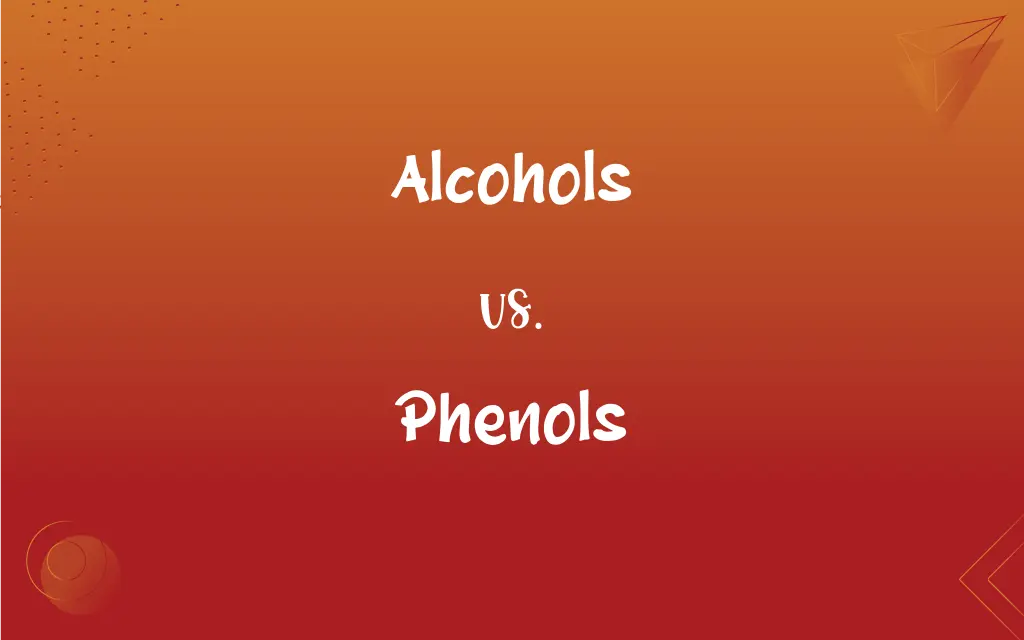Alcohols vs. Phenols: What's the Difference?
Edited by Aimie Carlson || By Harlon Moss || Updated on October 25, 2023
Alcohols are organic compounds with a hydroxyl (-OH) group bonded to a carbon atom, while phenols have a hydroxyl group bonded to a benzene ring.

Key Differences
Alcohols are versatile organic compounds that play an integral role in various industries, from beverages to fuels. They are characterized by the presence of a hydroxyl (-OH) group attached to a carbon atom. Phenols, on the other hand, are a subset of alcohols where the hydroxyl group is directly attached to a benzene ring, a hexagonal arrangement of six carbon atoms.
In terms of reactivity, alcohols exhibit a wide range of behaviors, often engaging in reactions that form ethers, esters, or halides. Phenols are distinct; their attachment to the benzene ring increases their acidity compared to regular alcohols. This difference in acidity is largely due to the resonance stabilization in phenols, which isn't present in standard alcohols.
From a usage perspective, alcohols are ubiquitous. They are used as solvents, antiseptics, fuels, and, of course, in beverages. Phenols, with their unique chemical structure, find utility in the production of plastics, resins, and drugs. Their antiseptic properties are also notable, making them valuable in healthcare applications.
It's essential to understand the structural and behavioral differences between alcohols and phenols. While both contain the hydroxyl functional group, their properties and applications vary significantly. Alcohols are more widespread and varied, while phenols, due to their aromatic nature, possess distinctive characteristics making them invaluable in specific industries.
Comparison Chart
Basic Structure
Hydroxyl group attached to a carbon atom.
Hydroxyl group attached to a benzene ring.
ADVERTISEMENT
Acidity
Generally less acidic.
More acidic due to resonance stabilization.
Common Uses
Solvents, beverages, fuels, antiseptics.
Plastics, resins, drugs, antiseptics.
Reactivity
Can form ethers, esters, halides.
Unique reactivity due to aromatic structure.
Bonding of Hydroxyl
Hydroxyl group bonded to sp3 hybridized carbon.
Hydroxyl group bonded directly to aromatic ring.
Alcohols and Phenols Definitions
Alcohols
Organic compounds containing a hydroxyl group.
Ethanol and methanol are common types of alcohols.
ADVERTISEMENT
Phenols
Alcohols with hydroxyl groups attached to a benzene ring.
Phenol itself is the simplest of the phenols.
Alcohols
Can be primary, secondary, or tertiary based on the hydroxyl's attachment.
Isopropanol is an example of a secondary alcohol.
Phenols
Generally more acidic than typical alcohols.
Phenols can lose their hydrogen more easily in reactions.
Alcohols
Widely used as solvents in laboratories.
Alcohols effectively dissolve many organic substances.
Phenols
Exhibit antiseptic properties.
Some phenols are used as disinfectants.
Alcohols
Exhibit varying degrees of reactivity.
Some alcohols react vigorously with active metals.
Phenols
Valuable in the synthesis of many industrial products.
Phenols are precursors to various plastics and resins.
Alcohols
Can be derived from natural sources or synthesized.
Fermented beverages contain naturally occurring alcohols.
Phenols
Unique aromatic characteristics due to benzene ring.
The presence of benzene sets phenols apart from other alcohols.
Alcohols
Any of a series of hydroxyl compounds, the simplest of which are derived from saturated hydrocarbons, have the general formula CnH2n+1OH, and include ethanol and methanol.
Phenols
A caustic, poisonous, white crystalline compound, C6H6O, derived from benzene and used in resins, plastics, and pharmaceuticals and in dilute form as a disinfectant. Also called carbolic acid.
Phenols
Any of a class of aromatic organic compounds having at least one hydroxyl group attached directly to the benzene ring.
Phenols
Plural of phenol
FAQs
Can alcohols be found in beverages?
Yes, many beverages like beer and wine contain alcohols, notably ethanol.
What makes phenols more acidic than regular alcohols?
The acidity of phenols is enhanced due to resonance stabilization from the benzene ring.
How are alcohols classified based on their structure?
Alcohols can be primary, secondary, or tertiary based on the hydroxyl's carbon attachment.
Can alcohols be used as fuels?
Yes, certain alcohols like ethanol can be used as alternative fuels.
How do phenols react with bases?
Phenols react with bases to form phenoxide ions, showcasing their acidic nature.
Are all alcohols flammable?
Many alcohols, especially those with shorter carbon chains, are flammable.
How do phenols differ structurally from alcohols?
Phenols have a hydroxyl group attached directly to a benzene ring.
Do phenols have any medicinal properties?
Yes, phenols have antiseptic properties and are sometimes used as disinfectants.
Are all alcohols safe for consumption?
No, only certain alcohols like ethanol are safe for consumption. Others, like methanol, are toxic.
Can both alcohols and phenols participate in hydrogen bonding?
Yes, the hydroxyl group in both alcohols and phenols allows for hydrogen bonding.
What functional group do alcohols possess?
Alcohols contain a hydroxyl (-OH) functional group.
What role do phenols play in the plastic industry?
Phenols are used in the production of certain types of plastics and resins.
Are phenols always solids at room temperature?
No, while many phenols are solid, some can be liquids depending on their molecular structure.
Do alcohols and phenols mix well with water?
Yes, due to their hydroxyl groups, both alcohols and phenols can mix with water, though the solubility might vary.
Can alcohols be oxidized?
Yes, alcohols can be oxidized to form compounds like aldehydes, ketones, and carboxylic acids.
Can phenols be synthesized in the lab?
Yes, there are various methods to synthesize phenols in laboratory settings.
Do phenols have a distinct smell?
Yes, many phenols have a characteristic aromatic odor.
Are phenols utilized in the pharmaceutical industry?
Yes, phenols are used in the synthesis of certain drugs and medicines.
Do alcohols and phenols have different boiling points?
Yes, due to their structures and the types of intermolecular forces involved, they have different boiling points.
What's a common use of phenols in households?
Phenols can be found in some household disinfectants and antiseptics.
About Author
Written by
Harlon MossHarlon is a seasoned quality moderator and accomplished content writer for Difference Wiki. An alumnus of the prestigious University of California, he earned his degree in Computer Science. Leveraging his academic background, Harlon brings a meticulous and informed perspective to his work, ensuring content accuracy and excellence.
Edited by
Aimie CarlsonAimie Carlson, holding a master's degree in English literature, is a fervent English language enthusiast. She lends her writing talents to Difference Wiki, a prominent website that specializes in comparisons, offering readers insightful analyses that both captivate and inform.
































































